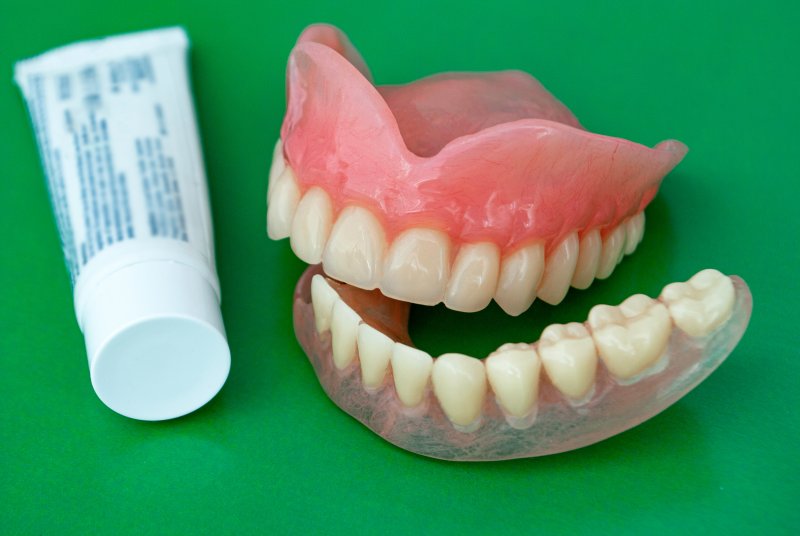
Dentures are more than an appliance, they’re a skill to be mastered and a tool to be utilized. However, if you’re new to dentures or if you’ve been experiencing more slippage than usual, you might need some assistance. Denture adhesive can be an important weapon in your arsenal for protecting against embarrassment or frustration.
If you want to know more about why your dentures won’t stay in place, and how denture adhesive can help, continue reading.
Why Do My Dentures Slip?
Your dentures may be slipping for a number of reasons:
Poor Fit
Ill-fitting dentures are the primary cause of slippage. If your dentures are not properly designed or have not been adjusted to fit your mouth correctly, they are more likely to move around.
Changes in Jaw Structure
Over time, the shape of your jawbone can change, especially after tooth loss. These changes can result in a poor fit between your dentures and your gums.
Reduced Saliva Production
Saliva helps create suction between the denture and the gums. Dry mouth, often caused by medications or medical conditions, can reduce this suction, and contribute to slippage.
Gums and Tissues Health
The health of your gums and oral tissues is important. Irritated or inflamed gums can make it harder for your dentures to stay in place.
Poor Denture Maintenance
Dentures that are not cleaned and maintained properly can accumulate debris and plaque, reducing their ability to maintain a secure fit.
How Do I Use Dental Adhesive?
Using the adhesive is as easy as on, two, three. Just follow these instructions and you’ll be smiling with confidence again in no time.
- Make sure that your dentures are properly cleaned before you attempt to use the adhesive. If you don’t, you’ll trap bacteria under the paste where they can continue to grow.
- Apply adhesive to your dentures in three small strips about an inch in length on both sides of the denture and in the middle. Ensure the adhesive isn’t too close to the edge of the denture or it may leak out.
- Put your dentures in and hold them firmly in place for a few seconds. Bite down gently to make sure they’re securely in place.
If your dentures still aren’t affixed to your gums, you can try adding a bit more of the adhesive. Be careful not to use it so much that it squishes out of the denture when you push on it. You should also ensure that you brush off the excess adhesive when you clean them for the night.
Dentures are a great solution to tooth loss, but they can have their quirks. Remember that adhesives should be used sparingly. If you find yourself needing them all the time, you should check with your dentist to see if adjustments need to be made. With a well-fitting denture and proper care, adhesives can help you enjoy socialization longer and improve your quality of life.
About the Practice
At Crossroads Family Dentistry your oral health is the priority. The team of talented and professional dentists is dedicated to providing the highest quality dental care. Their practice is equipped with state-of-the-art technology, ensuring that they offer the latest and most effective treatments to their patients. To schedule a denture consultation, call (434) 841-1704 or visit the website to explore other services.
